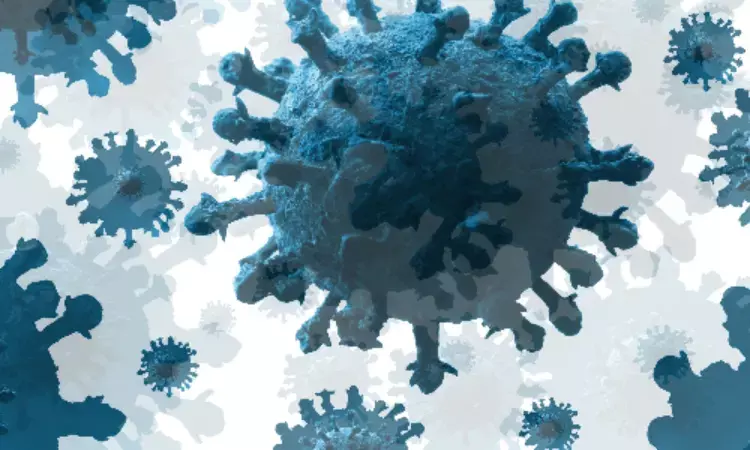- Home
- Medical news & Guidelines
- Anesthesiology
- Cardiology and CTVS
- Critical Care
- Dentistry
- Dermatology
- Diabetes and Endocrinology
- ENT
- Gastroenterology
- Medicine
- Nephrology
- Neurology
- Obstretics-Gynaecology
- Oncology
- Ophthalmology
- Orthopaedics
- Pediatrics-Neonatology
- Psychiatry
- Pulmonology
- Radiology
- Surgery
- Urology
- Laboratory Medicine
- Diet
- Nursing
- Paramedical
- Physiotherapy
- Health news
- Fact Check
- Bone Health Fact Check
- Brain Health Fact Check
- Cancer Related Fact Check
- Child Care Fact Check
- Dental and oral health fact check
- Diabetes and metabolic health fact check
- Diet and Nutrition Fact Check
- Eye and ENT Care Fact Check
- Fitness fact check
- Gut health fact check
- Heart health fact check
- Kidney health fact check
- Medical education fact check
- Men's health fact check
- Respiratory fact check
- Skin and hair care fact check
- Vaccine and Immunization fact check
- Women's health fact check
- AYUSH
- State News
- Andaman and Nicobar Islands
- Andhra Pradesh
- Arunachal Pradesh
- Assam
- Bihar
- Chandigarh
- Chattisgarh
- Dadra and Nagar Haveli
- Daman and Diu
- Delhi
- Goa
- Gujarat
- Haryana
- Himachal Pradesh
- Jammu & Kashmir
- Jharkhand
- Karnataka
- Kerala
- Ladakh
- Lakshadweep
- Madhya Pradesh
- Maharashtra
- Manipur
- Meghalaya
- Mizoram
- Nagaland
- Odisha
- Puducherry
- Punjab
- Rajasthan
- Sikkim
- Tamil Nadu
- Telangana
- Tripura
- Uttar Pradesh
- Uttrakhand
- West Bengal
- Medical Education
- Industry
Clostridioides difficile Infection Exacerbates COVID-19 Outcomes

A recent study conducted using the extensive National Inpatient Sample (NIS) database has shed light on a concerning association between Clostridioides difficile infection (CDI) and coronavirus infection (COVID-19). This research published in the Gastroenterology Research analyzed data from adult patients hospitalized with COVID-19 in 2020 revealed that CDI significantly worsens outcomes in these patients.
Among the 1,045,125 COVID-19 hospitalizations studied, 4,920 patients also had a secondary diagnosis of CDI. The findings demonstrated that patients with both CDI and COVID-19 faced graver challenges in their healthcare journey compared to those with COVID-19 alone.
The study employed a rigorous methodology. Researchers delved into the NIS database to identify adult patients primarily hospitalized due to COVID-19. These patients were then segregated into two groups based on CDI status. Detailed analysis ensued, comparing various factors between these groups.
Specifically, the researchers examined baseline characteristics, including age, gender, and race. They also evaluated the Charlson Comorbidity Index (CCI) to gauge the patients' overall health status. Furthermore, the study investigated several critical outcome measures, such as length of hospital stay, total hospital costs, and inpatient mortality.
To ensure the validity of their findings, the researchers conducted multivariate logistic and linear regressions. These statistical analyses helped identify independent predictors of CDI and mortality within the cohort of COVID-19 patients.
The study reveals that CDI is an independent factor contributing to increased mortality among patients admitted with COVID-19. This finding underscores the gravity of CDI within the context of the ongoing COVID-19 pandemic.
Patients who contracted both CDI and COVID-19 experienced more extended hospital stays and incurred significantly higher hospital costs. Perhaps most alarmingly, their inpatient mortality rate was markedly higher than that of COVID-19 patients without CDI. This data emphasizes the importance of recognizing and addressing CDI as a critical healthcare concern in the management of COVID-19 cases.
Source:
Deda, X., Elfert, K., Gandhi, M., Malik, A., Elromisy, E., Guevara, N., Nayudu, S., & Bechtold, M. (2023). Clostridioides difficile Infection in COVID-19 Hospitalized Patients: A Nationwide Analysis. In Gastroenterology Research (Vol. 16, Issue 4, pp. 234–239). Elmer Press, Inc. https://doi.org/10.14740/gr1639
Neuroscience Masters graduate
Jacinthlyn Sylvia, a Neuroscience Master's graduate from Chennai has worked extensively in deciphering the neurobiology of cognition and motor control in aging. She also has spread-out exposure to Neurosurgery from her Bachelor’s. She is currently involved in active Neuro-Oncology research. She is an upcoming neuroscientist with a fiery passion for writing. Her news cover at Medical Dialogues feature recent discoveries and updates from the healthcare and biomedical research fields. She can be reached at editorial@medicaldialogues.in
Dr Kamal Kant Kohli-MBBS, DTCD- a chest specialist with more than 30 years of practice and a flair for writing clinical articles, Dr Kamal Kant Kohli joined Medical Dialogues as a Chief Editor of Medical News. Besides writing articles, as an editor, he proofreads and verifies all the medical content published on Medical Dialogues including those coming from journals, studies,medical conferences,guidelines etc. Email: drkohli@medicaldialogues.in. Contact no. 011-43720751


